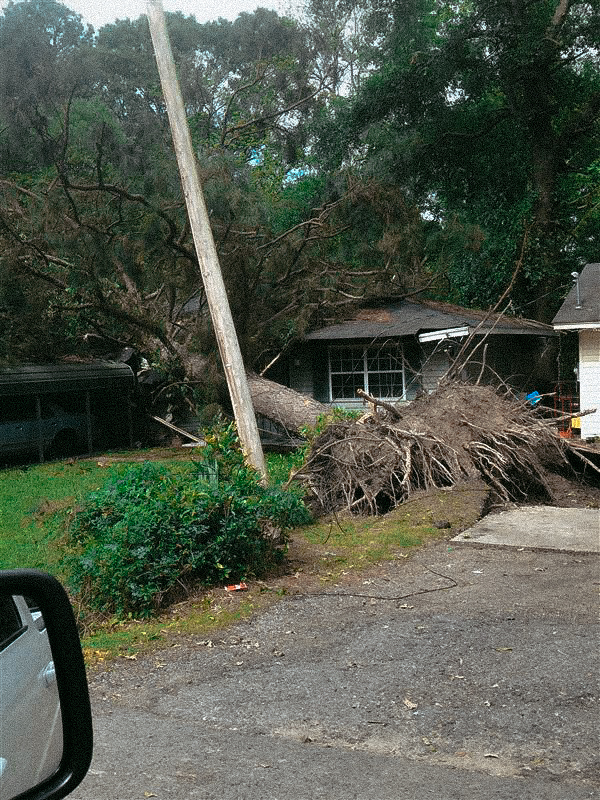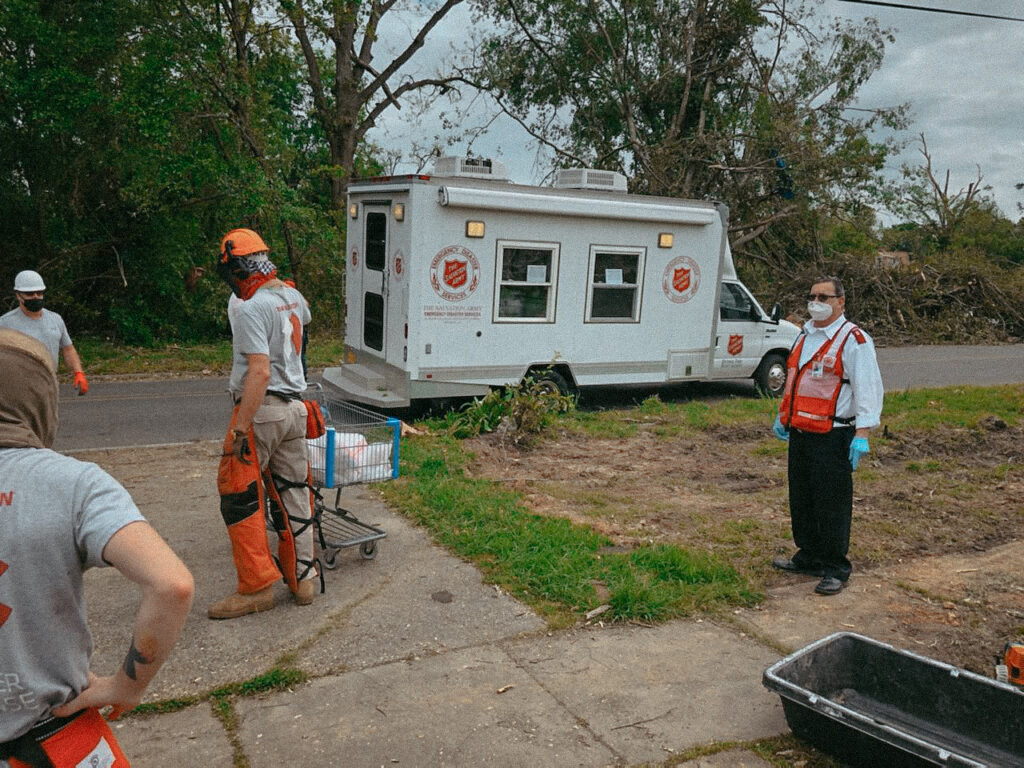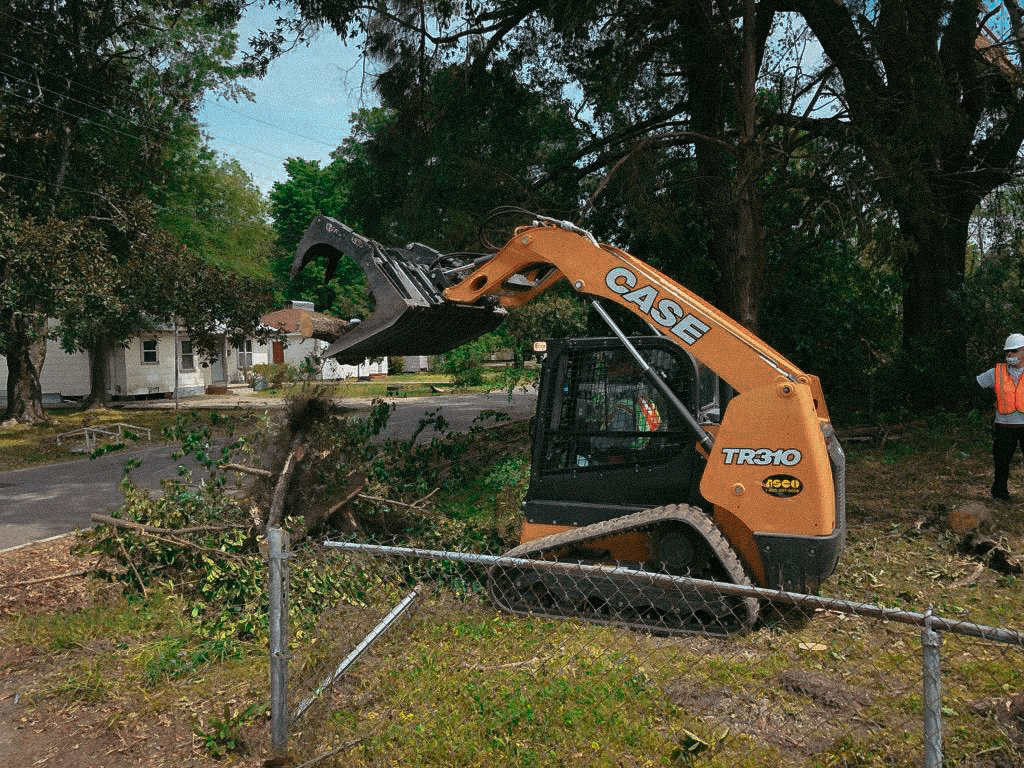Chainsaws began flying in Monroe, LA this morning, and there was nothing the coronavirus could do to stop them. Wielding the blades—and driving the skid steers and backhoes chugging along the Louisiana streets—were more than two-dozen Team Rubicon volunteers who had descended upon the Ouachita Parish seat to help clear it of debris.

As it turns out, Mother Nature doesn’t care about a pandemic, she has her own plans. On Easter Sunday, not one but three tornadoes tore through the Ouachita Parish, leaving at least 270 homes east of town and 30 in West Monroe damaged in its wake, according to local media reports. All this, in a region hit hard by the coronavirus, with 411 cases—and climbing—among its population of just more than 161,000 as of April 15.
Offers of Medical Assistance Lead to Tornado Response
Even before those tornadoes touched down, Team Rubicon had been in touch with Monroe’s emergency manager. In early April, using an algorithm developed using public datasets, the organization had identified the Ouachita Parish as being extremely vulnerable in the face of the coronavirus. Set smack in the middle of the state, between Shreveport, LA and Vicksburg MS, Monroe has a population just shy of 50,000. While it is the biggest city in the area, by no means is it a metropolis; the city has just around 350 hospital beds in total.
The region also has a steadily increasing rate of COVID-19 infections. If it continues, not only will Monroe have to deal with its own local needs, it will also likely have to absorb people from rural communities with coronavirus symptoms.

As the coronavirus case count was trending up in the area, it became apparent to Team Rubicon that the city and surrounding parish was likely facing ever-thinning margins to absorb demand for medical care. And so, less than a week before the tornado, Team Rubicon reached out to the city’s emergency manager letting them know they could offer things like health and medical support at medical facilities, help stand up ancillary field medical stations to decompress hospitals, and even mobile COVID-19 testing assistance.
“Ouachita Parish had a higher concentration of coronavirus cases, even though they aren’t a big city. They are a rural, at-risk community with a smaller medical system,” said Steve Flemming, the senior associate of disaster operations for Team Rubicon’s South Central territory. “We reached out originally because we realized the area was saturated and could be on the verge of tipping.”
And so, the conversation began. But with no immediately identifiable needs, the groups agreed to circle back after Easter. And then, came the tornados, clocking in with wind speeds of up to 140 mph, toppling hundreds of trees and ripping roofs off homes.
Clearing the Roads for First Responders
If Mother Nature was going to go about her regular business, then so would Team Rubicon. Instead of bringing in nurses and EMTs as initially expected, Team Rubicon sent out but heavy equipment operators instead. It became one of the organization’s first non-medical disaster relief operations in the COVID-19 environment.

Beginning on April 16, a group of 30-or-so Team Rubicon volunteers plugged into the Ouachita Paris to clear roadways of debris, help lift trees fallen across roofs, and give Louisianans back access to their critical infrastructure—including to those local hospitals and medical centers. For the Greyshirts, that they are responding during a pandemic seems to matter very little. Maybe social isolation is easier when you’re running heavy equipment, anyway. By day, they’ll social distance from behind a chainsaw or the cage of a tractor; at night, they’ll bunk down head to foot, every cot spaced six or more feet from the next. And when they return home two weeks on, they’ll likely have to self-isolate for another two weeks.
By then, though, they hope to have left something else behind: roads clear enough for ambulances to travel. Or, a lawn cleared enough to set up a triage tent or field medical station or decontamination station, should the city end up needing Team Rubicon’s nurses and EMTs to help deliver care for people with coronavirus symptoms, too.



